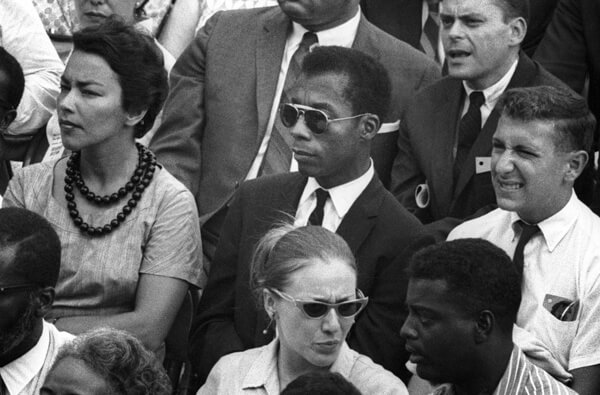James Baldwin, as seen in Raoul Peck’s “I Am Not Your Negro.” | MAGNOLIA PICTURES
The extraordinary documentary “I Am Not Your Negro” uses text from James Baldwin’s unfinished work “Remember This House,” along with archival footage ranging from the author speaking at Cambridge University to his appearance on “The Dick Cavett Show,” as the cornerstone for examining the oppression and invisibility endured by African Americans – then and now.
Director Raoul Peck judiciously intercuts Baldwin’s texts and appearances with images drawn from school integration battles and vintage Hollywood films as well as more contemporary footage of Rodney King and the Black Lives Matter movement. The result, a Best Doc Oscar nominee, is a sobering, stirring probe into race’s impact on America.
“To be a Negro in this country and to be relatively conscious is to be in a rage almost all the time,” Baldwin, an out gay man who lived from 1924 until 1987, eloquently states at one point in the film. (His life as a gay man is not explored, though there are several fleeting references to his homosexuality.)
Raoul Peck has James Baldwin speak for himself to heighten the immediacy of his urgent voice
Viewers of “I Am Not Your Negro,” however, are as likely to be inspired as enraged. In a recent phone interview, Peck explained that his film is “about the words and the importance of this man and his work.”
“My motivation — and I started 10 years ago, before Obama — was that there was this feeling that the way we were handling the discussion about race in this country was resolved,” he said. “We have Black History Month, and Martin Luther King Day, and a black bourgeois, which profited from the Civil Rights Movement. The ones who are still poor or are in the ghettos and victims of violence, it’s their fault. We were going further and further away from Baldwin, who was lesser and lesser known in this country. He was seen as a has-been or a minor writer, and there was all this ignorance.”
Peck, who was born in Haiti, said that he came to appreciate Baldwin after someone gave him a copy of “The Fire Next Time,” and has been reading and reflecting on the author ever since. Working alone, Peck secured the rights to Baldwin’s body of work from the author’s estate, and he took the time to make the film he wanted.
“The film was about how do I make sure James Baldwin is remembered, and his words come back center stage?,” he explained.
To do this, the documentarian decided he had to confront the audience directly with the author’s words. He features no talking heads in “I Am Not Your Negro” — “because no one has to interpret Baldwin,” Peck insisted.
“It has to be as direct and raw as Baldwin can be so the present generation has access to what I had access to when I was young,” he continued. “So they can see through the confusion of a media world where people are getting data without any information.”
The film toggles back and forth in time to contrast history with current events to show how things have — or sadly, have not — changed in the decades since Baldwin wrote his books and gave his speeches.
Peck is successful in making these connections resonate because of the care he took in assembling the film. When the filmmaker discovered a quote of Baldwin’s, he would also find notes from the author such as: “I was listening to this music when I was talking about that…” Discoveries prompted Peck to investigate: What was that music? Because he did his homework, the film is richer and more illuminating.
One of the best qualities of “I Am Not Your Negro” is Baldwin moving audiences – both at the time and those today who will see him speaking in Peck’s film – to think about representations of African Americans in popular culture and political discourse. When Baldwin unpacks the image of Joan Crawford in 1931’s “Dance, Fools, Dance,” admiring her beauty and talent, he also questions the lack of roles for African Americans in the musicals of that era.
Peck appreciates Baldwin’s ability to stir such introspection.
“No one who sees my film can be innocent anymore,” he said. “You’ve seen through the machine. You can watch the musical and beautiful people dancing in a magical world, but then you question — where are the others? You can’t watch those films the same way again.”
That perspective, Peck asserted, can change the way Americans engage the culture and the political system.
“It should be part of our education, how to watch images, TV, and the entertainment industry,” he said. “Baldwin likens it to the use of a narcotic. Reality shows are there to empty your brain, and if your brain is full of ‘Real Housewives of Atlanta,’ how can you make a revolution?”
He continued, “The magic of a musical — you can get into it, and let yourself go. But that’s soft power. This idea goes everywhere in the world. I grew up watching ‘Tarzan’ and John Ford films, and even in Haiti, playing Cowboys and Indians as a child, no one wanted to be the Indian. That’s how ideology functions, as well. The same is true with gender images of women or a little girl. Nothing is innocent. I wish that people will get that from the film and question what they are watching.”
Baldwin certainly questioned and critiqued what he saw, in his writing and his speeches. Peck’s astonishing film “I Am Not Your Negro” could well prompt renewed participation in the conversations Baldwin started.
I AM NOT YOUR NEGRO | Directed by Raoul Peck | Magnolia Pictures | Opens Feb. 3 |Film Forum, 209 W. Houston St. | filmforum.org


















